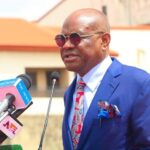Nigeria’s first Professor of Corporate Governance, Fabian Ajogwu, SAN has stated that existing regulations and code on conduct guiding the transition of ex-regulators to corporate roles meets global standards.
He called for the need to create awareness of stakeholders on the process. Ajogwu further stressed the importance of transparency in the implementation of extant regulations in relation to the “revolving door” phenomenon.
This submission was made at the 30th edition of the Nigerian Economic Summit Group’s CEO Breakfast Meeting organised in collaboration with the Federal Ministry of Budget and Financial Planning under the theme: “Revolving Door: Navigating Public-Private Transitions,” in Abuja on Wednesday, October 16, 2024.
Ajogwu observed that while the migration of ex-senior regulatory officials to corporate roles in sectors they once regulated had its inherent benefits to the advancement of both the public and private sectors, there is a need for the standardization of the mandatory “cooling-off” periods across different sectors.
Cooling-off periods refer to the stipulated time that must elapse before individuals who once held senior regulatory positions can take up employment at private institutions, they previously supervised.
The Senior Advocate of Nigeria stressed that the cooling-off period is necessary to promote ethical conduct in business and preclude conflict of interest but decried the disparity in the length of the cooling-off period across sectors, which could range from three to five years and the seemingly low level of awareness of the regulatory guidance.
He noted that while Principle 25.2.8 of the Nigerian Code of Corporate Governance 2018 mandates a 3-year waiting time before a regulatory officer can transition to a private role, Principle 36 of the Nigerian Communications Commission’s Draft Guidelines on Corporate Governance 2023 proffers a cooling-off period of three to five years based on seniority level. Ajogwu called for the standardisation of these cooling-off periods across all sectors to enhance consistency and mitigate potential conflicts of interest that may arise.
Ajogwu emphasized the need for regulators to strengthen their enforcement mechanisms to safeguard the integrity and health of the business environment. He maintained that while the enforcement mechanisms of regulators vary by industry, it is essential to have automatic penalties for some governance infractions and enhance the capacity of regulatory bodies to monitor and enforce compliance with existing rules and regulations.
He also called for the country to strengthen the alignment of its public-private transition practices with global best standards. Ajogwu noted that while Nigeria’s current practices are consistent with other jurisdictions, efforts should be made to have unified cooling-off periods similar to other regions.
He observed that the European Union imposes a two-year cooling-off period from former regulatory officials and requires that they notify the EU of their new employment details for avoidance of conflict of interest.
Dr. Emomotimi Agama, Director General of the Securities and Exchange Commission (SEC), served as the lead discussant. He underscored the importance of public-private transitions, stating, “These transitions are not merely desirable; they are essential for promoting collaboration and innovation. The exchange of knowledge and expertise between these sectors can greatly enhance their respective capabilities, contributing to a dynamic and resilient economy.” Dr. Agama further emphasized the SEC’s commitment to fostering an environment where such transitions benefit both sectors while maintaining market trust and confidence. He described these transitions as “bridges connecting two vital sectors of the economy,” which, when conducted transparently, can enrich public governance and invigorate private enterprise.
The Director General stressed the need to harmonise private-sector efficiency with the stability of the public sector. He emphasised the power of balancing the strengths of both sectors in building a robust and viable economy.
The stakeholders at the summit reached a consensus on the need to build public awareness and understanding of the existing regulatory frameworks. They also agreed on the importance of continuously assessing mechanisms to enhance enforcement and implementation to ensure sustained trust in the system.
Participants also agreed that there is a need for constant debate on the public to private sector transitioning to boost public-private partnerships, economic growth, and innovation, however, the transitions should not undermine the sanctity of public duty.
As Nigeria continues to position itself as a leader in managing public-private transitions, the insights and recommendations from this summit are expected to play a crucial role in shaping future policies and practices. By building on its strong foundations and addressing identified gaps, Nigeria aims to set a benchmark for effective governance and collaboration between the public and private sectors.

 Join Daily Trust WhatsApp Community For Quick Access To News and Happenings Around You.
Join Daily Trust WhatsApp Community For Quick Access To News and Happenings Around You.


